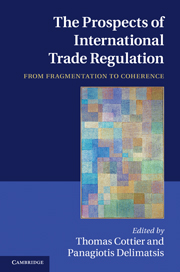Book contents
- Frontmatter
- Contents
- List of figures
- List of tables
- Contributors
- Preface and acknowledgements
- Table of cases
- List of abbreviations
- Introduction: fragmentation and coherence in international trade regulation: analysis and conceptual foundations
- PART I Constitutional issues in international trade regulation
- PART II Reforming specific areas of trade regulation
- 4 Reframing sustainable agriculture
- 5 Energy in WTO law and policy
- 6 Developing trade rules for services: a case of fragmented coherence?
- 7 Challenges of biotechnology in international trade regulation
- PART III ‘Trade and…’ linkages
- Index
- References
6 - Developing trade rules for services: a case of fragmented coherence?
from PART II - Reforming specific areas of trade regulation
Published online by Cambridge University Press: 26 April 2011
- Frontmatter
- Contents
- List of figures
- List of tables
- Contributors
- Preface and acknowledgements
- Table of cases
- List of abbreviations
- Introduction: fragmentation and coherence in international trade regulation: analysis and conceptual foundations
- PART I Constitutional issues in international trade regulation
- PART II Reforming specific areas of trade regulation
- 4 Reframing sustainable agriculture
- 5 Energy in WTO law and policy
- 6 Developing trade rules for services: a case of fragmented coherence?
- 7 Challenges of biotechnology in international trade regulation
- PART III ‘Trade and…’ linkages
- Index
- References
Summary
KEY MESSAGES
∙ Trade in services ranks among the most intractable subject matters in modern trade diplomacy. Confronted with such complexity, diversity, learning by doing and fragmentation are key characteristics of the evolving regimes governing services trade.
∙ Fragmentation may represent a source of policy and innovation able to inform and shape future directions in multilateral rule-making. It can also offer alternative theatres of collective action able to yield superior outcomes or more politically palatable bargains than those on offer at the World Trade Organization (WTO) or under preferential trade agreements (PTAs).
∙ The adoption of a necessity test applicable across services sectors and enhanced transparency disciplines would improve the quality of services trade regulation. The absence of a necessity test can devalue regulatory disciplines on domestic regulation.
∙ The immigration law caveat of the GATS Annex on the Temporary Movement of Natural Persons and flexibilities within the structure for scheduling GATS commitments exacerbate the divide between a global labour migration regime favouring high-skilled workers and bilateral, non-trade migration agreements regulating the flows of low-skilled and potentially irregular migrants. This schism prevents progress towards a coherent global governance of migration.
∙ The interpretation of the ‘likeness’ concept in the GATS rules on non-discrimination requires an assessment of the competitive relationship between suppliers and services in the marketplace. As trade in services may involve the movement of suppliers and services, consideration must be given to both service-related and supplier-related factors in order to reach an overall conclusion on the competitive relationship between the types of service transactions under scrutiny. […]
- Type
- Chapter
- Information
- The Prospects of International Trade RegulationFrom Fragmentation to Coherence, pp. 245 - 283Publisher: Cambridge University PressPrint publication year: 2011
References
- 1
- Cited by



